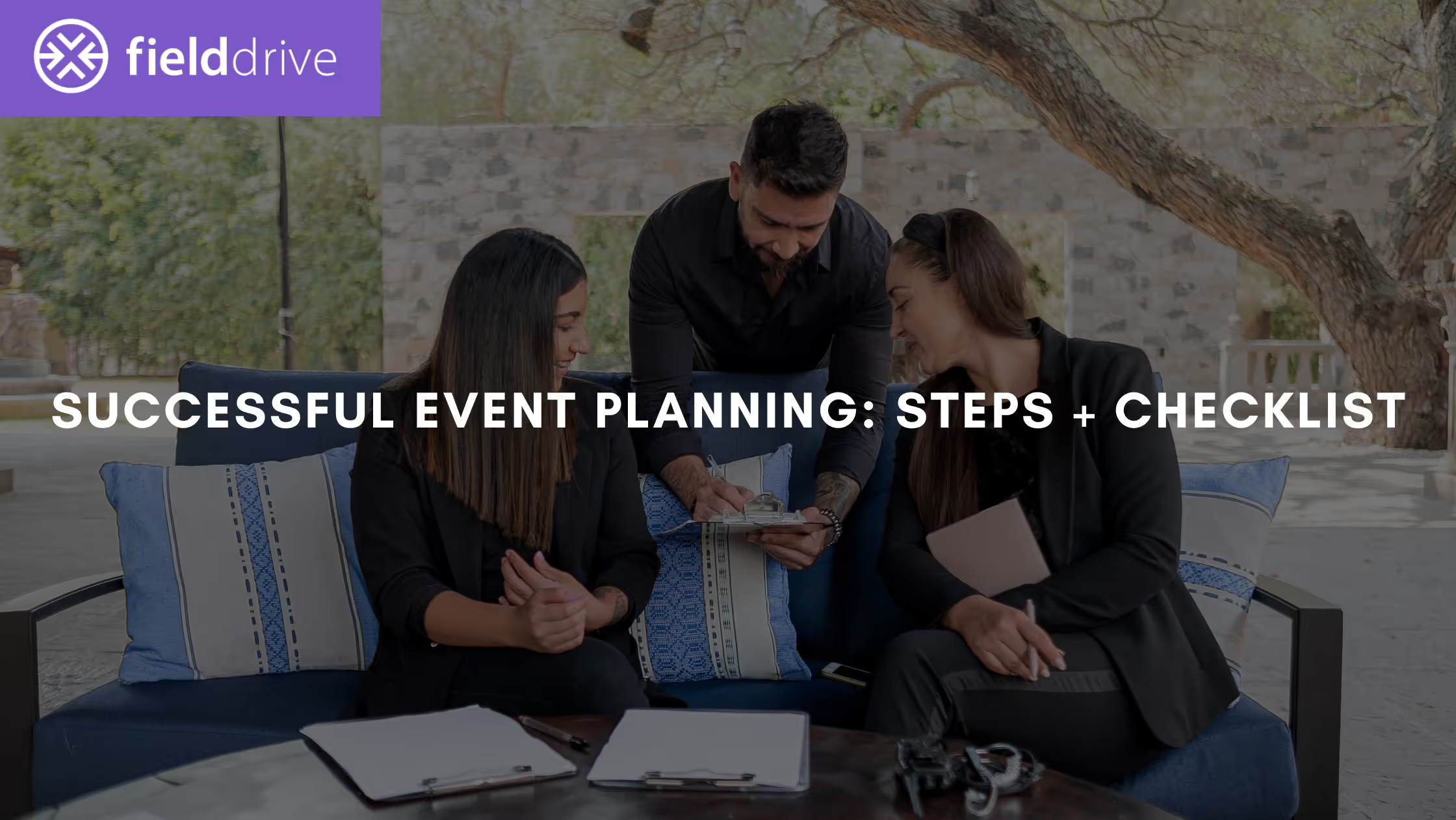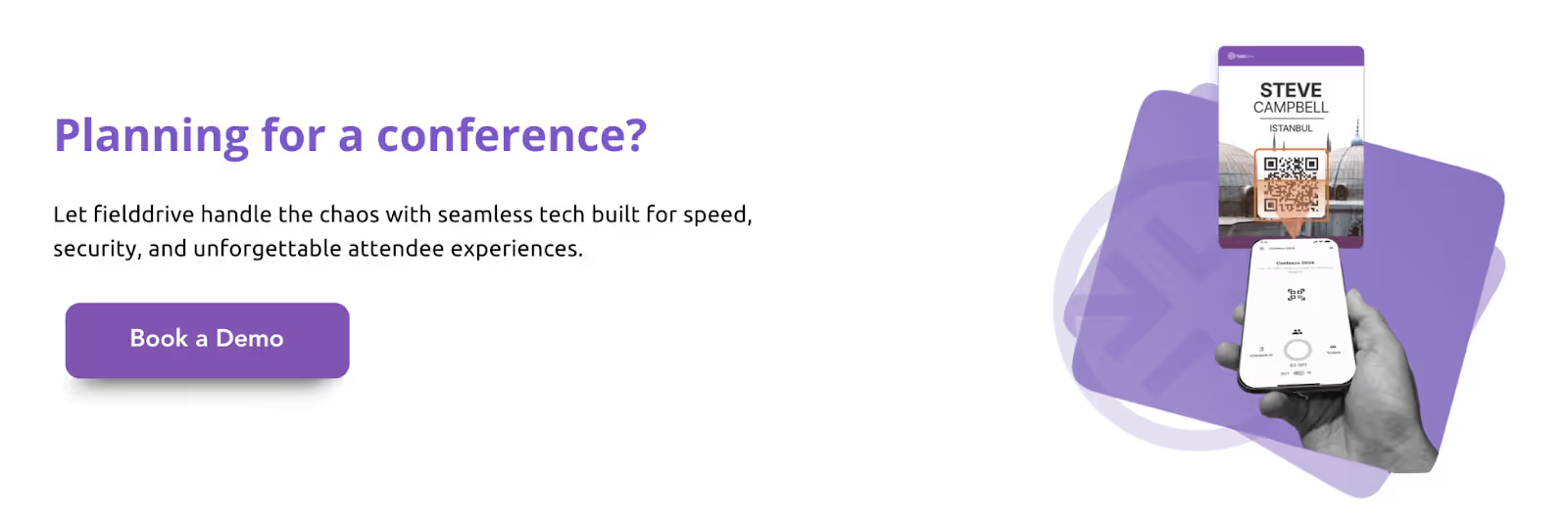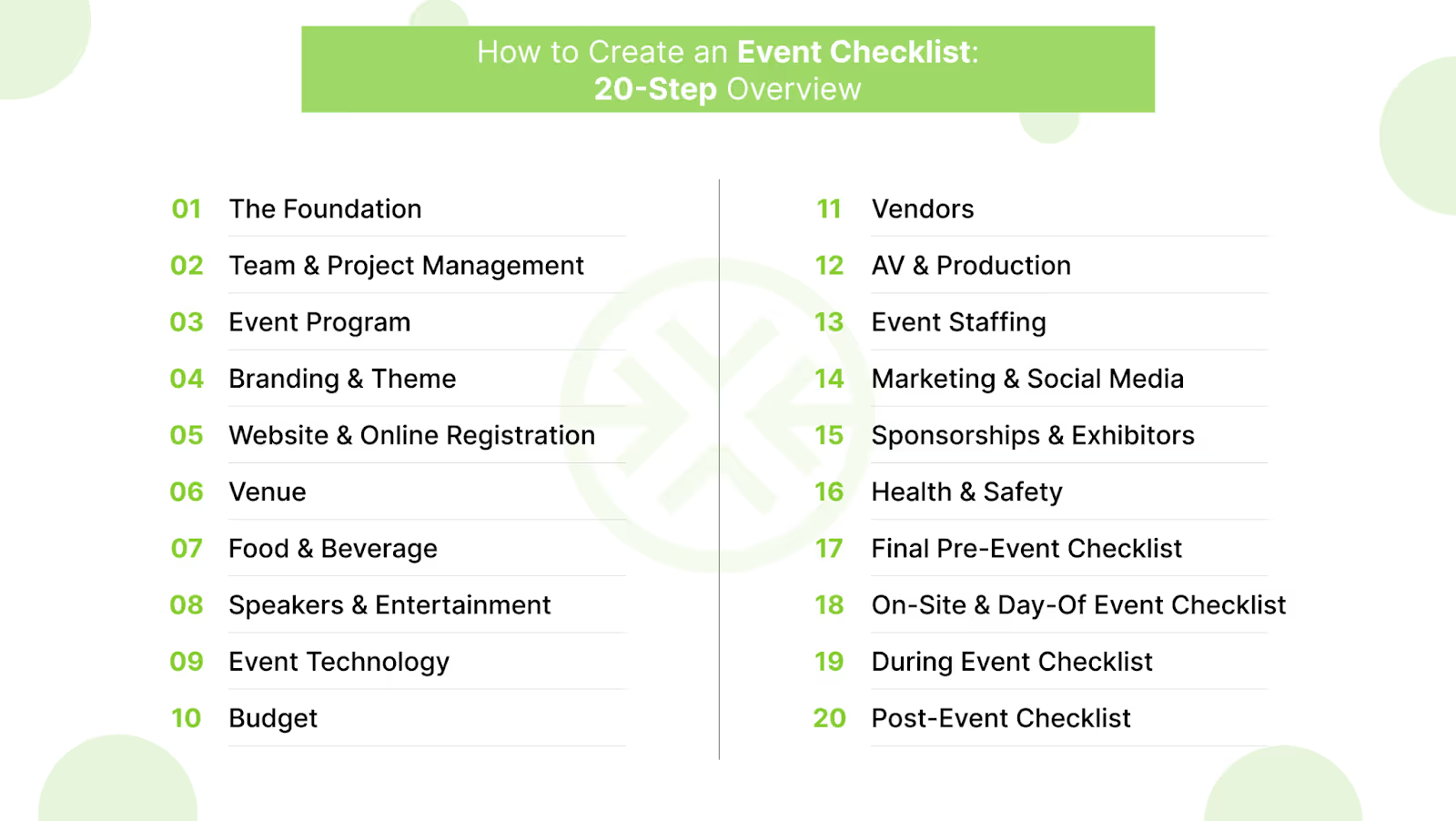The Best Event Planning Checklist to Use in 2025
Discover the ultimate event checklist for successful planning. These simple steps will guide you to organize any event smoothly, from start to finish.

CONTENT
Planning an event can feel overwhelming, but with the right approach, it doesn’t have to be. Whether you're hosting a small conference or a large trade show, every detail matters.
In fact, according to a report by Technavio, the global events industry is set to grow by USD 1.07 trillion from 2025 to 2029, at a 13.5% annual growth rate. As the market expands, the demand for streamlined, efficient planning becomes even more crucial.
You might be thinking, “Where do I start?” That’s where a solid event checklist comes in. It’s your blueprint, guiding you from start to finish, ensuring no detail is left behind.
This post will walk you through the ultimate checklist and the key steps to creating a successful event planning checklist. It covers everything from setting goals to wrapping up after the event to help you plan top-notch events without a glitch.
What Components Should an Event Checklist Have?
When planning an event, missing details can cause last-minute headaches and stress. That’s where a solid event checklist comes in—it helps you stay organized and on track from start to finish. Covering every crucial aspect ensures nothing slips through the cracks and your event runs smoothly. Here’s what your event checklist should include:
- Event Date
- Location
- Type of Event
- Goals and Objectives
- Budget
- Timeline and Milestones
- Logistics
- Technology Requirements

The Ultimate Event Planning Checklist Template
.avif)
To discover more useful event planning assets, check out fielddrive Academy—our one-stop resource center for all your event planning queries and needs!
How to Create an Event Checklist: The 20-Step Plan
Creating an event checklist is all about breaking down the planning process into clear, manageable steps. Organizing each task logically ensures nothing gets overlooked and everything runs smoothly from start to finish. Let’s take a look at the steps to build a checklist that keeps your event on track and stress-free.

1. The Foundation
12 Months Out
- Define event objectives and success metrics.
- Choose a tentative event date and location (country, city, venue).
- Estimate the expected attendance size.
- Decide on an event name or working title.
- Assemble the core planning team and assign initial roles.
- Set a preliminary budget and identify funding needs.
- Determine if the event will be ticketed and draft a pricing strategy.
8 Months Out
- Research and shortlist potential venues.
- Check venue availability and request pricing, including extras like catering and AV.
- Begin drafting a detailed budget with income and expenses.
- Identify early bird or discount ticket options.
- Confirm availability of speakers, performers, or special guests and initiate contracts.
- Negotiate and finalize contracts with the venue and key vendors.
- Arrange accommodation room blocks and travel plans.
- Obtain legal and senior management approvals.
2. Team and Project Management
10 Months Out
- Identify the full project team and clearly define roles.
- Allocate tasks and set deadlines for each team member.
- Establish communication channels and reporting schedules.
6 Months Out
- Conduct regular progress meetings and milestone reviews.
- Assign backup team members for critical roles.
- Update task lists and timelines based on progress.
3. Event Program
9 Months Out
- Design overall event structure and agenda (single/multi-track).
- Plan session types to maximize learning and engagement.
- Schedule adequate breaks and downtime.
- Decide on room layouts supporting session formats and attendee flow.
4 Months Out
- Confirm session speakers and topics.
- Integrate event technology to support engagement goals.
- Develop a measurement plan for session effectiveness.
4. Branding and Theme
8 Months Out
- Finalize event logo and visual identity.
- Develop branding guidelines to ensure consistency.
- Collect logos and branding requirements from partners and sponsors.
3 Months Out
- Review all marketing materials for branding alignment.
- Coordinate décor and signage designs to reflect the theme.
5. Website and Online Registration
9 Months Out
- Launch event website with basic details and registration info.
- Set up an online registration platform to manage RSVPs and ticket sales.
2 Months Out
- Regularly update the website with new event info and FAQs.
- Monitor registration progress and troubleshoot issues.
6. Venue
8 Months Out
- Create detailed venue layouts, including session rooms and exhibitor spaces.
- Coordinate logistics for loading, parking, and accessibility.
- Identify venue contact points for planning and day-of coordination.
1 Month Out
- Confirm accessibility accommodations and communicate special needs.
- Test venue WiFi and technical capabilities; arrange upgrades if necessary.
7. Food and Beverage
7 Months Out
- Determine catering needs and service style.
- Gather dietary requirements from attendees or VIPs.
1 Month Out
- Finalize catering order, timing, and staff requirements.
- Confirm arrangements for special meals and VIP catering.
8. Speakers and Entertainment
6 Months Out
- Communicate session expectations and AV needs to speakers.
- Collect bios, photos, and presentation materials.
- Book travel and accommodation.
2 Weeks Out
- Confirm arrival and rehearsal schedules.
- Finalize contact details and rehearsal logistics.
9. Event Technology
6 Months Out
- Research and shortlist event tech solutions (apps, streaming, engagement tools).
- Finalize on-site event tech solutions like check-ins, badge printing, etc.
- Arrange demos and gather quotes.
3 Months Out
- Train staff on event tech usage.
- Implement and test technology.
- Inform attendees about tech features and benefits.
fielddrive simplifies event logistics with its touchless check-in kiosks and customizable attendee badges. The touchless kiosks enhance security and streamline entry, making the process quick and efficient.
10. Budget
Throughout Planning
- Update the budget regularly with actuals and forecasts.
- Monitor ticket sales and revenue against targets.
- Identify budget shortfalls early and adjust as needed.
11. Vendors
5 Months Out
- Schedule vendor meetings and site visits.
- Confirm deliverables and contract details.
1 Month Out
- Reconfirm vendor schedules and readiness.
- Share contingency plans for any vendor issues.
12. AV and Production
4 Months Out
- Define desired AV effects and requirements.
- Confirm stage size, cue systems, and backup plans.
1 Week Out
- Conduct rehearsals and technical run-throughs.
- Finalize equipment setups and troubleshoot potential issues.
13. Event Staffing
3 Months Out
- Recruit and assign staff roles.
- Brief staff on event goals and common attendee questions.
1 Week Out
- Confirm staff schedules and dress codes.
- Conduct final briefings and distribute instructions.
14. Marketing and Social Media
6 Months Out
- Create and approve marketing strategy and goals.
- Develop event hashtag and social media content calendar.
1 Month Out
- Launch social media campaigns and press releases.
- Coordinate influencer and partner promotion.
15. Sponsorships and Exhibitors
6 Months Out
- Identify and approach potential sponsors.
- Prepare sponsorship packages aligned with the sponsor's goals.
2 Months Out
- Finalize exhibitor manuals and logistical instructions.
- Confirm exhibitor services and setup times.
16. Health and Safety
6 Months Out
- Secure necessary permits, licenses, and insurance.
- Schedule multi-agency planning if applicable.
1 Month Out
- Review risk assessments and emergency plans.
- Train staff on security protocols and emergency procedures.
17. Final Pre-Event Checklist (1-2 Days Out)
- Confirm the final attendee list and share with all relevant teams.
- Conduct a complete venue walkthrough to check setups and layouts.
- Test all AV equipment, WiFi, barcode scanners, and check-in technology.
- Print and organize badges, place cards, signage, and handouts.
- Distribute final staff schedules and role assignments; hold last briefing.
- Verify catering details and communicate any last-minute dietary changes.
- Confirm speaker and performer arrival times and rehearsal schedules.
- Share emergency protocols and contact lists with all event staff.
- Pack event manager kits with essentials (tools, stationery, chargers, etc.).
- Coordinate final vendor deliveries and confirm setup times.
- Ensure accessibility accommodations are in place and communicated.
- Send final reminder emails or messages to attendees with event details.
- Confirm security arrangements and staff briefing on protocols.
- Arrange transport and onsite storage for event materials and giveaways.
- Verify press and media logistics and photographer/videographer readiness.
18. On-Site and Day-Of Event Checklist
Arrival and Setup (4-6 Hours Before Event Start)
- Conduct a detailed venue walkthrough with the core team and vendors.
- Oversee the setup of signage, registration desks, and exhibitor booths.
- Test all AV, lighting, and event technology one last time.
- Confirm WiFi and network stability for all devices.
- Check attendee check-in kiosks and badge printers for functionality.
- Review emergency exits and safety equipment locations with staff.
fielddrive provides self-check-in kiosks with facial recognition technology and instant badge printing that speed up check-ins and enhance security, ensuring a smooth entry process for attendees.
Pre-Event (1-2 Hours Before Start)
- Hold a morning briefing to review the schedule, roles, and responsibilities.
- Confirm the arrival of speakers, VIPs, sponsors, and exhibitors.
- Test microphones, projectors, and presentation tech during rehearsals.
- Ensure the registration team is ready and staffed at check-in points.
- Verify catering setup and service timeline with food vendors.
- Set up social media stations for live updates and attendee engagement.
19. During Event Checklist
- Monitor check-in flow and troubleshoot issues immediately.
- Keep the event on schedule by tracking session start and end times.
- Engage with attendees, addressing questions or concerns promptly.
- Manage speaker transitions and cue the AV team for smooth presentations.
- Oversee catering service and ensure attendees' comfort throughout the day.
- Track session attendance and lead retrieval data if applicable.
Closing and Breakdown (After Event Ends)
- Supervise breakdown of booths, signage, and technical equipment.
- Ensure all rental equipment is accounted for and packed securely.
- Coordinate with vendors for the timely pickup or return of materials.
- Collect lost and found items and manage attendee inquiries.
- Conduct quick debriefs with the team to identify immediate concerns.
- Secure venue and confirm final checklist with venue management.
20. Post-Event Checklist
Within 24-48 Hours After the Event
- Send thank-you emails to attendees, sponsors, speakers, and staff.
- Distribute post-event surveys to gather feedback on the experience.
- Collect and review event data, including attendance, engagement, and sales.
- Update website and social media with event highlights and content.
- Share photos, videos, and session recordings with attendees.
1 Week After Event
- Conduct debrief meetings with the core team to evaluate successes and challenges.
- Review vendor performance and finalize all outstanding payments.
- Analyze budget vs actual expenses and update financial records.
- Compile detailed event reports with key metrics and lessons learned.
- Follow up with sponsors and exhibitors regarding ROI and future involvement.
2 Weeks and Beyond
- Plan for early marketing of the next event based on feedback and outcomes.
- Archive all event materials, contracts, and documentation for future reference.
- Schedule ongoing communication to keep the community engaged.
- Review technology performance and plan improvements or upgrades.

Plan Your Next Event with fielddrive
Creating a well-structured event checklist ensures that every aspect of your event is planned and executed flawlessly. From setting clear goals to managing logistics and technology, an effective checklist helps you stay organized, reduce stress, and deliver a memorable experience for your attendees.
fielddrive supports your event planning with cutting-edge technology that streamlines the process and enhances the attendee experience. With a focus on innovation and sustainability, fielddrive offers a range of solutions that streamline event management and enhance the attendee experience.
Key Features of fielddrive:
- Touchless Check-In Kiosks: Speed up registration and enhance security with contactless entry solutions.
- Facial Recognition: Enable fast, secure check-ins that reduce wait times and improve the attendee experience.
- Real-Time Badge Printing: Print customized badges on demand, reducing waste and ensuring seamless branding.
- Lead Retrieval: Empower exhibitors with tools to capture and manage valuable attendee information, maximizing their ROI.
- Session Tracking and Analytics: Gain insights into attendee behavior and session popularity with comprehensive data analytics.
- Sustainable Solutions: Opt for eco-friendly badges and materials supporting your sustainability commitment.
Partner with fielddrive to create an unforgettable experience for your attendees. Request a free demo today!
Want to learn how fielddrive can help you elevate your events?
Book a call with our experts today



.png)
.svg)
.svg)
.svg)

.svg)